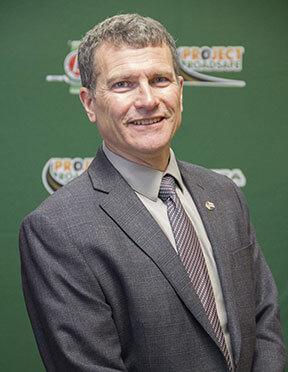Ken Pidgeon ‘84 is the CEO and “Lead Technical Specialist” of Vermont’s Engineers Construction, Inc. (ECI), a heavy civil construction company founded by his father Alan (UVM BSCE 1960). Ken enjoys an active and balanced life between ECI and his other passions of road bicycling and fly fishing - which includes angling for salmon on Lake Champlain even in winter. As a licensed professional engineer, Ken is engaged in engineering communities including the American Society of Civil Engineers, the American Railway Engineers & Maintenance-of-Way Association, Vermont Association of General Contractors, and the UVM CEMS Board of Advisors. He is also a fan and supporter of UVM Athletics.
Q: When you were pursuing your undergraduate degree at UVM in Civil Engineering, did you know you would go into the family business?
KP: Yes, it was in the back of my mind but it wasn’t until later in college that I became excited about heavy civil work. Just after graduate school at UNH, I landed in the consulting world at a geotechnical engineering firm in Boston where I specialized in deep foundations and designing excavation support systems. Within a few years I became licensed and continued working in the Boston area for 13 years total. In 1998 I joined the family business and moved my young family to Essex Junction. I would advise anyone who plans on joining a family business to spend the early part of his or her career doing something different. The outside perspective I brought into my family business has been incredibly valuable.
Q: What were those first years like for you at ECI? What are the most valuable lessons you’ve learned since then?
KP: During my first year back ECI was awarded a contract for a 100-mile-long underground fiber optic project along the railroad from Burlington to White River Junction. One of my first tasks was to figure out how to do it. From that need, I developed a system to install conduit along the railroad, which was later patented. The Rail Plow project was very exciting as we were using not just excavators but locomotives to perform the work. Most importantly, I learned that my ideas coming from the consulting world were different but not necessarily a bad fit for the construction side of the industry – as proven by the Rail Plow success.
Q: You’ve mentioned that one of your primary corporate duties is to develop and maintain a corporate culture that fosters safety, quality, and integrity within the context of engineering. Tell us about how you achieve this.
KP: For a business, it’s all about corporate culture when it comes to safety, quality, and integrity. As an engineer in the heavy civil construction industry, I spend a lot of time helping our non-engineer workforce to better understand engineering principals involved in their work. Even safety is best understood in the context of engineering.
I strongly believe in the ECI code of conduct which I developed. The code fosters safety, quality and integrity just as much as it supports a cohesive sense of community among our employees, while it also supports the well-being of individuals.
Every Thursday I send an email to all our employees that highlights one of the code’s 13 elements. The email also includes a technical discussion, news, and pictures of current work sites. Every Friday morning we have a safety training that all employees attend and the email is the format to the meeting.
Q: What do you look for when hiring new people?
KP: We look for people who are passionate and who are drivers. By a driver I mean a personality that is going to “get ‘er done!” I tell my guys who hire: ask the candidate to walk across the yard. Are they a slow shuffler or do they have spring in their step? We want to see a spring in his or her step.
I also put a high value on an engineer’s writing skills. Writing isn’t just about grammar but about framing a problem and presenting it in written form. In my work writing is a discovery process to find solutions to problems. Complex technical project plans need to combine drawings and text to create a thoughtful narrative that others can follow and build upon. It’s essential to the work.
Q: Any advice for the CEMS class of 2016?
KP:
· Don’t let my generation judge you for what you’ve done (or what you haven’t done), but instead for your potential.
· Set long-term goals and short-term milestones.
· Strive to be a licensed professional.
· Build your resume with professional certifications (like the 40 hour HAZWOPER training), publications, and community service.
· Take advantage of your youth and the opportunity that good health brings.
· Live as if you’ll live to be at least 100 years old and stay healthy until the end.
· Strive for restraint, discretion and integrity!
Here’s a snapshot of some of Ken’s most memorable projects with ECI
ECI Repairs GMRR Bridge #114 in Chester, VT
ECI’s East Rygate Culvert project
Also:
Burlington Fiber Optic Project with the Rail Plow (1998)
Synchronous Condenser Project in Williamstown, VT (2007)
CCTA Bus Terminal (Ongoing)
Bellows Falls Tunnel Clearance Project (2008)
Learn more about the ECI Code of Conduct
Learn more about Ken from his CEMS Board of Advisors Profile
